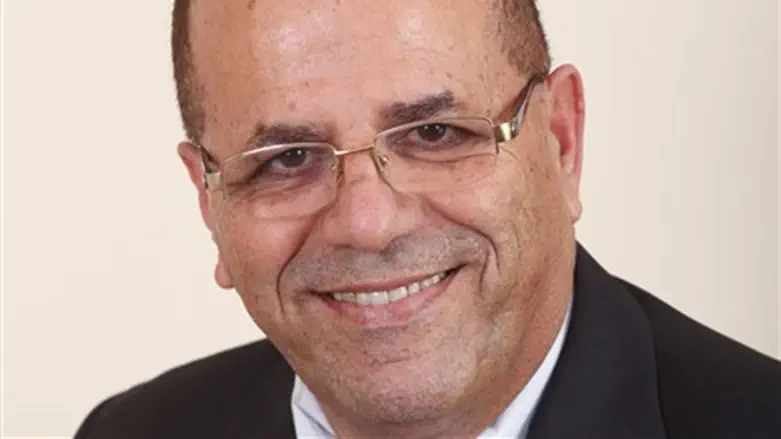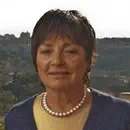
Veteran MK Ayoub Kara was chosen recently for the prestigious post of Minister of Communications by Prime Minister Netanyahu. It is a position the prime minister considers so important that he filled it himself until the Supreme Court ruled that he had to choose someone else – and even then, Netanyahu waited until the last permissible minute to announce his choice.
Arutz Sheva talked to the affable – and personable - Druze Minister about how it is to be the first non-Jewish minister-with-portfolio to serve in the Knesset of the Jewish State.
There is no question that Kara's background puts him squarely in the Zionist camp.
Can you tell us "who you are"?
Kara: My family's roots here and their relationship with the Jewish people go back a long way. The Druze, we believe, go back to Jethro, the father in law of Moses, whose advice was crucial to the great Jewish leader.
My family owned the estate where the famous Sir Laurence Oliphant built his home and that is where Naftali Imber wrote the Hatikva, the poem that was later to become Israel's national anthem. Now that home is the Druze IDF memorial. No one dreamed then that a grandchild of the Kara family would be a minister in an Israeli government and that as an MK, he would propose and see to the passing of the Flag, Emblem and National Anthem Law.
My grandfather was a delegate to Keren Hayesod, the pre-independence Zionist government, from 1930-1948. He helped Jews fleeing Europe during those years, finding shelter for many of them.
Wasn't it dangerous to be a Zionist in those days? And a Druze Zionist to boot?
Kara: My grandfather paid dearly for standing up for his beliefs. The anti-Zionist Arabs sought to teach him a lesson. One of his sons was murdered in 1939 by anti-Zionist Arabs, shot in broad daylight in Acco. A second was kidnapped in 1947 and never heard from again. He is memorialized in the Druze Yad Lebanim (the beautiful memorial to the Druze IDF soldiers who fell defending Israel, commanding a view of the surrounding Galilee vistas, ed.)
My father himself was in the IDF and fought in the Galilee in Israel's War of Independence, where he was severely wounded.
You, too, served in the IDF, correct?
Kara: Both of my brothers were killed defending the State of Israel which they were raised to love. One was killed in the eastern sector of Lebanon and another was wounded there, later dying of his injuries. I was wounded in Beirut, but survived - recognized by the IDF as a wounded veteran - to continue the family name. My mother told me I had to marry and have 6 children, triple the number of children she lost. And I did just that – with my eldest studying medicine in Ariel University, another at Haifa University, down to the ones still in school. Our family is based in Dalyat el Carmel.
How does the Israeli public greet your appointment? It is obvious that Leftist Israeli media find it difficult to swallow that this historic event happened under Prime Minister Netanyahu's watch and are constantly looking for ways to try to pour cold water over the friendship between the two of you, both staunch Likud members.
Last week, it was claimed that you met the Western Saharan president without permission from Netanyahu, when what really occurred was that you were introduced to him at the inauguration of the president of Ecuador and spoke to him in Arabic.
Kara: I regret the constant attempts to tarnish my name as a representative of the State of Israel endeavoring to promote peace with the Arab world. I met the president of Western Sahara at the inauguration of the president of Ecuador, together with the Israeli ambassador to Ecuador who was also present at the event.
My mother tongue is Arabic and that allows me to serve Israel in behind the scenes situations. That should elicit support, not criticism.
Why did you decide to run for the Knesset in the first place?
Kara: I wanted to influence the way the country is going and I felt that I could contribute. My family has identified with the Jewish people from pre-state days. I thought a non-Jew who feels like the most Zionist person on this earth, could help in many ways. And that is what has happened and is still happening.
I have been a Likud member from the start. Ariel Sharon promised me a ministerial post without portfolio, but then went back on his word and appointed someone else who was charged with a criminal offense after several months in office.
Binyamin Netanyahu and I are close friends and have become even closer in the year I have been in the government. And now, I have been honored to be chosen the first Minister-with-portfolio who is not a Jew.
What are your core political beliefs?
Kara: Well, I am clearly identified as absolutely right-wing and continue to believe in the Revisionist policy that says that we can achieve peace without giving in and giving up land.
What do you see as your unique contribution?
Kara: My being a non-Jew whose mother tongue is Arabic allowed me to hold preliminary secret meetings with Arab leaders – such as those in Africa. We hope to reach the point where a significant number of Arabic speaking countries do not join our enemies in attacking us and that is beginning to become the new reality. I didn't talk about the relationship with Saudi Arabia out loud because I would have been laughed at when it was in my plans, but now we realize it as a possibility.
What is the most significant development?
Kara: We are in a political process in this part of the world without any connection to the Palestinian Arabs. Think of the importance of economic and other ties with 30 Sunni states.
How did this become a viable scenario?
Kara: We have Iran to thank – their militancy brought about a Sunni coalition. The war within Islam brings Israel closer to the Saudis, with or without the Palestinian Arab issue.
I am still acting to take advantage of my background and next week there will be a surprise having to do with my meeting someone. And no, I won't give out the information yet.
You have become the savior of anyone from Israel who finds himself in a dangerous situation in the Arab world. Tell our readers about it.
Kara: My connections prevented Israeli Arabs who almost joined ISIS from going to Syria, their families had turned to me for help. Just last week I was able to save 3 Bedouin who found themselves stuck in Jordan. I found myself doing similar things in Turkey, North Africa, Syria and Iraq, the Gulf Emirates as well.
I also do as much as I can in humanitarian efforts on Israel's border with Syria. Israel's image is excellent there, everyone wants to come to the Jewish State for medical treatment – it's the same in the entire Arab world.
I support and help the organization that brings children from Arab countries who have acute cardiac problems to Israel. There are about 70 children here at any given moment, and they even come from as far as Kurdistan.
In another vein, as a member of the government, I was able to advance the plans for Red Sea-Dead Sea Water Conveyance, also known as the Two Seas Canal. Shimon Peres, whose idea it was, called me to this office and complimented me on my success in advancing the idea in the Arab world, and repeated his appreciation before he died. I stuck to my guns on the issue and that is the secret, along with being above-board and using my mastery of Arabic to build trust.
What do you have to say about the young Druze adults today?
Kara: The younger generation has complaints about the social and welfare situation vis a vis the Druze. However, they enlist in higher proportion than Jewish Israelis and are the leading officers in crucial units. The motivation to be part of Israel's army remains the same, although there are those trying to impair it, such as the Arab Joint List party and European-funded NGOs.
What do you think of the Trump administration?
Kara: I am the only person who visited Trump in his staff headquarters when he was here. I told him that his initiative is the only chance to change anything, because if he can't achieve peace, no one can. I told Melania Trump and Sara Netanyahu that they should foster a friendship and ignore the paltry criticism that accompanies their every step. I told them to stand behind the two great leaders whom they can encourage to work together to bring more tranquillity to the region.
And what about the Palestinian Arabs, they are not the center stage in the Middle East anymore, but they are very much here.
Kara: I have been pushing forward the plans for an industrial area for the PA Arabs and Israelis. I believe that they will think twice before destroying their source of income by supporting terror if we make it worthwhile. I helped promote the Jericho industrial park in cooperation with the Japanese and the one near Jenin with Turks. We have to fight terror with strength, but we also have to give them a working economy so they have something they don't want to lose.
Of course, we have to ask about the challenges facing you in your new position.
Kara: The new broadcasting authority will be my biggest challenge, but it is still being adjucated in the courts, so I have breathing space to study it thoroughly. After the case is decided, I will be more forthcoming!
Bezeq has a problem at the moment, but despite what the media have been saying, they are totally private and do not fall under the aegis of the Communications Ministry anymore.
Share your vision for the Ministry with us.
Kara: My vision is to benefit the Israeli public, by lowering prices through privatization. I put HOT into competition with Bezeq and that is the beginning of the process. That's the general direction I wish to take
We wish you continued success and good luck, Minister Kara, and thank you for your time.
